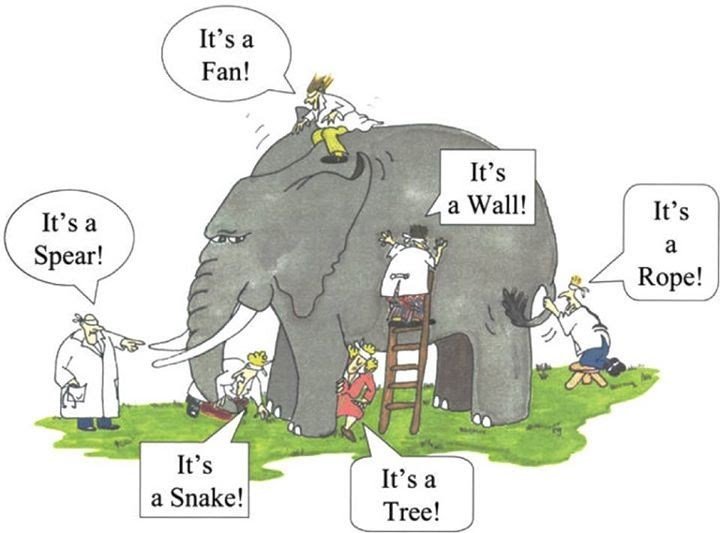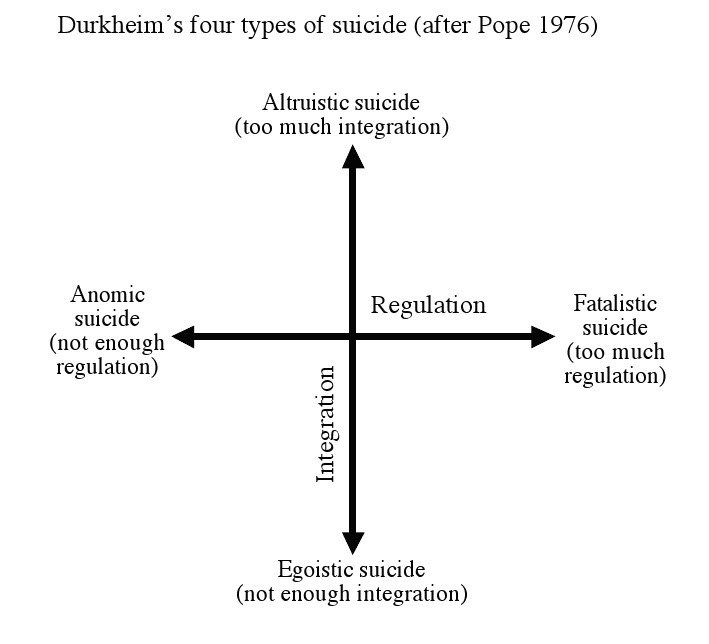Suicide – A Social Fact | Common sense vs Sociological thought
There will always be a contradictory outlook between common sensical notions and sociological thoughts. “Common” in the word “common sense” means the minimum body of knowledge that one is expected to possess in order to deal with everyday situations. We derive common sense from our past experience or from parental and societal pedagogies.

The issue with common sense is our experiences are limited. Sometimes our interpretations of experiences can be biased. ‘A human sees what he wants to see, and hears what he wants to hear’ (Blind man and elephant, see fig.). He simply seeks answers which are very easy to understand and implement. We always tend towards certainty rather than experimentation.

Sociology tried to address this problem scientifically. The most fundamental emphasis of sociology is on “THINGS ARE NOT WHAT THEY SEEM”. Sociological studies were/are supplementing/refuting the naturalistic explanations(which are made with the help of common sense) with proper scientific theorizations and observable patterns.
Sociological Study Of Suicide
From the time of memory, suicide was established as a psychological fact. Suicide hardly excited any natural scientist except psychologist. Sociologists took up the study of suicide after the industrial revolution with empirical data from various coroners in West Europe. Sociologists tried to tie various suicides to prevailing social conditions.

Animal societies do not sustain for a long time they are based on instincts. Animals live for survival and don’t develop any noticeable conscience. Human society, on the other hand, is sustainable and continuous because it has its foundation on shared ideas and collective conscience. Now, what is collective conscience? It is nothing but beliefs and sentiments which are common to average members of society. Each and every individual is conditioned to act according to that conscience. The government and various institutions (like law, police, etc..) are created to maintain and legitimize the collective conscience of a society.
When people deviate (crime, suicide, etc..) from collective conscience and assert their own, such a situation is called Anomie. For example, Iraq, Nigeria, Syria, Yemen are going through high anomic phases where deviance of individuals from acceptable norms is very high (ISIS, Boko Haram, etc..).
Also Read – The Power of Self Destruction
Some key findings of the study
Suicides are considered as social facts by sociologists. They tried to study it at a societal level and not at an individual level. We might come across certain personal problems like (unemployment, relationship troubles etc..) for committing suicide, but if we observe carefully, we can find out societal patterns that have their share of cause. Sociologists, when studied the historical records, found some patterns in suicides.
- Rate of suicide in Protestants > Rate of suicide in Catholics
- Rate of suicide in men > Rate of suicide in women
- Unmarried > Married
- Suicide during peacetime > Suicide during wartime
Protestants led a movement against Catholics and rejected all the doctrines proposed by Catholics. Protestant countries developed free inquiry of religion and scientific facts, freedom to question, abolished hierarchy in the church system. On the other hand, Catholics were people who readily accepted faith taught by the church, believed in a hierarchy in the church system, and followed certain rules strictly like visiting the church every Sunday.
With all this, solidarity among Catholics is more, and therefore suicide rate was very low compared to protestants who suffered from a lack of solidarity and lack of social contact.
During two world wars, this world may have lost billions of currencies and millions of lives, but interestingly the suicide rate was very low in war times. People developed a sense of solidarity in standing with their nation and their mind was preoccupied with a sense of nationality which pushed aside their personal level hardships.

It was also observed that people who involve in kinship and sexual relationships with others, the suicide rate was less. Unmarried are more prone to suicides than married.
With all the above empirical data we can build some theories. It is visible that suicides are always influenced by not only personal traumas but also prevailing social and religious conditions. We can build an equation with available information.
Suicides ∝ 1/solidarity
There are multiple factors and multiple causes that influence society and individuals. It is not possible for us to study all at once. Therefore, we bring down the parameters to 2. They are:
- Integration ( Religion, Relations, family, etc..)
- Regulation (Govt, police, law, etc..)
“More of anything is poison, less of anything is injustice”. Therefore, any of the above if more or less for a person becomes a potential reason to commit suicide.
Also Read – Battle of Forced Marriages
Classification of Suicides

- Fatalistic suicide – committed by slaves, war prisoners, childless women
- Anomic suicide – suicides during economic depressions, failed to achieve goals
- Egoistic suicide – orphans, family-less persons, divorced
- Altruistic suicide – suffering from disease, sati system
Way Forward
Sometimes, the outcomes of the above theory will be different. People instead of committing suicide turn to crime, robberies, potential targets of radicalization, hunger, and rogues. This situation is always detrimental to society as a whole.
Sociological scientists never refuted the psychological causes of suicide but only tried to explain the social causes associated with it. Psychology and society each have their own share of causal effect to any suicide.
In this fast-moving world, society had become complex with low mutual cooperation and low emotional attachments. This kind of society will always have diluted solidarity which leads to less integration. There are parts and roles for each and every social institution in society to accept and facilitate the living of our fellow humans. Everybody is fighting a war about which we know nothing. We, as an evolved society, must act in an accommodative manner to ease the agony of fellow individuals. Until that happens, our society remains only as an evolved society, not a progressive one.
What is your comment on suicide? Let us know in the comments section. Also, follow and visit Just A Library for more interesting news on various domains.
Stay Tuned !! Stay Updated !!
Guest Author – Atreya A
I am Ek aam aadmi who likes normalcy. Teaching is my passion and being a teacher I experience a sparkle in my students’ eyes that only a teacher can see. My dream is that someday people study about me.
Follow me on social handles:
- Instagram – https://www.instagram.com/a_t_r_e_y_a/
- Facebook – https://www.facebook.com/atreya.amnda
